Unit 3语法练习
仁爱英语八上unit-3-词、语法练习

Unit 3 topic 11。
be interested in 对…感兴趣2。
be fond of 喜欢3。
prefer doing sth。
更喜欢做某事4。
collect stamps 收集邮票5. plant flowers 种花6。
go hiking 去远足7. climb mountains 爬山8. used to do sth 过去常常做某事9. of great value 价值连城10。
make model planes 制作飞机模型11. hate doing sth/hate to do sth 讨厌做某事12. teach sb to do sth 教某人做某事13. what sb like 某人喜欢的14。
bring sth to sb 带某物给某人15。
help sb (to)do sth 帮助某人做某事16. daily work 日常工作17。
and so on 等等18. whether…or not 是怎样还是不是怎样19. sound good 听起来不错20. in one’s spare time=in one’s free time在某人空闲时间21。
keep pets 养宠物22。
walk a pet dog 遛狗23. go out 出去24. go fishing 去钓鱼25。
go climbing mountains 去爬山语法:used to 表示过去常常发生的动作或存在的状态.ed to 后面接动词原形:2.否定:used not to =didn’t use to 不曾3.一般疑问句及回答和特殊疑问句一、词汇(A)根据句意及首字母提示补全单词。
1. He often goes swimming during summer v_______.2。
My favorite pet is a cat。
Because it’s funny and _______。
Unit3知识点+语法综合练习牛津深圳版英语九年级上册
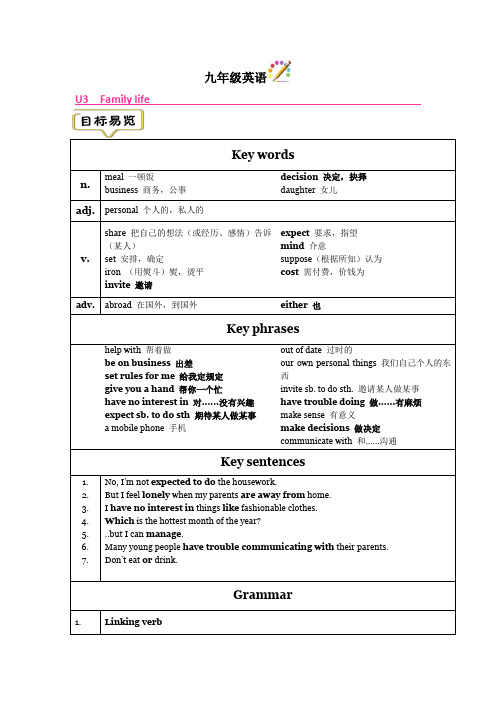
九年级英语U3 Family lifeKey wordsn.meal 一顿饭business 商务,公事decision 决定,抉择daughter 女儿adj.personal 个人的,私人的v.share 把自己的想法(或经历、感情)告诉(某人)set 安排,确定iron (用熨斗)熨,烫平invite 邀请expect要求,指望mind 介意suppose(根据所知)认为cost需付费,价钱为adv.abroad 在国外,到国外either 也Key phraseshelp with 帮着做be on business 出差set rules for me 给我定规定give you a hand 帮你一个忙have no interest in 对......没有兴趣expect sb. to do sth 期待某人做某事a mobile phone 手机out of date 过时的our own personal things 我们自己个人的东西invite sb. to do sth. 邀请某人做某事have trouble doing 做......有麻烦make sense 有意义make decisions 做决定communicate with 和......沟通Key sentences1.2.3.4.5.6.7. No, I’m not expected to do the housework.But I feel lonely when my parents are away from home.I have no interest in things like fashionable clothes.Which is the hottest month of the year?..but I can manage.Many young people have trouble communicating with their parents. Don’t eat or drink.Grammar1. Linking verb知识清单● Unit3 1.①expect+ 指望/期望做某事②be expected to do 被要求做某事2.have no interest in sth对某事不感兴趣-----反义词:be interested in+ sth 对..感兴趣3.“也”(用于否定句的句末)“也”(用于肯定句的句末)“也”(用于肯定句的句中)“也”(用于肯定句的句末)4.invite sb + sth邀请某人做某事5.花费:①:人+ +时间/钱+on sth人+spend+时间/钱+(in)sth②:人+ +钱+ +sth③:It+takes+人+时间/钱+④:事物+cost+人+时间/钱6.unless 除非,如果不=if not7.offer+ sth主动提出做某事8.have trouble/difficulty+(in)sth 做某事有困难9.It‘s+no+形容词+for sb + 对于某人来说…做某事是…It’s+not+形容词+for sb+ 对于某人来说…做某事是…10.set rules sb 为某人制定规矩短语聚会1.I don’t think my mother understand me我认为我妈不理解我(否定转移)2.make sb do 使某人做某事3.be wide awake 完全醒着4.feel tired 感到疲惫5.cook meals 做饭6.talking and sharing 交流与分享7.make a decision to do sth =decide to do sth 决定做某事8.interview sb on sth 就sth 采访sb 9.be expected to do 被期盼做某事10.expect sb to do 期盼某人做某事11.go out for dinner 外出就餐12.be on business 出差13.go abroad 出国14.set rules for sb 为某人制定规矩15.much bigger than 比….大Much+比较级16.feel lonely 感到孤独17.be away from 离开18.have no interest in=be not interested in 对…没有兴趣19.out of date 过时的20.help with帮着做21.wash the dished 洗碗22.look after=take care of 照顾23.have a close relationship with sb 和某人有亲密关系24.school events学校活动25.be on a trip 在旅行26.make sense 有道理27.mind doing sth 介意做某事28.suggest that sb should do sth 建议某人坐某事29.get much pocket money 得到许多零花钱30.support each other 互相支持municate with sb 与某人交流32.have trouble doing sth=have difficulty doing sth 做某事困难eful tips 有用的提示34.make a list of sth 列出清单35.disagree about sth 不同意某事36.try to do 尽力做某事37.go your way按你的方法走38.be ready to do sth 准备好做某事39.be convenient for sb 对sb 方便的40.be patient with sb 对某人有耐心41.in addition 除此之外42.get angry 生气43.part of 部分的44. for too long 太久45.be not allowed to do sth 不被允许做某事46.at the weekend 在周末47.on weekdays在工作日48.at a time 一次49.look like 看起来像50.include(v)including(prep.)包括words and sentences单词拼写1.. She often goes a_________ with her family.2. This is my p________ computer. I use it every day.3. She i_________ me to have dinner yesterday.4. I s________ my cake with him yesterday.5. I like my classmates and we have a good r_________.6.Mr.Brown has a son and a d________ .7.I like this t of clothes.8.She has made a d________ about going to join us.二、完成句子1.这个女孩对理科不感兴趣。
Unit3特殊疑问词引导的宾语从句语法练习人教版九年级英语全册

Unit 3 Could you please tell me where the restaurant ?语法讲练(有答案)语法专项—特殊疑问词引导的宾语从句语法链接+练习、答案一、特殊疑问词引导的宾语从句(一)概念当宾语从句是特殊疑问句时,疑问词就是宾语从句的引导词。
连接代词who,whom,whose,which,what和连接副词where,how,why,when可引导宾语从句,并在从句中做一定成分。
(二)连接词的含义及功能词类词汇中文含义在句中的功能例句连接代词who 谁(主格)除在句中起连接作用外,还在宾语从句中做主语、宾语、定语或表语。
Do you know who will e this afternoon?(who在宾语从句中做主语)whom 谁(宾格)Please tell me whom we have to see .(whom 在宾语从句中做宾语) whose谁的(所有格)She asked whose hair band that was.(whose在宾语从句中定语)what 什么I wonder what I should do next .(what在句中作宾语)which 哪个I’m not sure which direction is correct .(which在句中作定语)连接副词when 什么时候除在句中起连接作用外,还在宾语从句中做状语,不能省略。
I want to know when the plane will take off.(when在宾语从句中做状语)where什么地方;哪里She wonders where the speaker es from .(where在句中做状语)how 怎样;如何I wonder how she learned to play the piano so well in such ashort period of time .(how 在句中做状语)why为什么;……的原因Please explain why you were late for class again.(why在宾语从句中做状语)【注意】(1)how 与某些形容词或副词构成的词组也可以引导宾语从句,主要有how old ,how many, how much, how long , how often , how far 等。
2022人教版英语八年级上册Unit3 单元语法+练习附答案

八年级上册unit3语法知识讲堂形容词、副词的比较级比较级用于两者(人或事物)的比较,突出其中一个。
在上下文明确的情况下,比较级也可单独使用。
【例句】Tom is taller than Jack.汤姆比杰克高。
【例句】Kate's room is nice and her mother's room is nicer. 凯特的房间很漂亮,她母亲的房间更漂亮。
【例句】This box is bigger than that one. 这个箱子比那个箱子大。
【例句】The first question is very difficult. But the second one is more difficult.第一个问题很难,但第二个问题更难。
2.比较级的构成(1)单音节词和部分双音节词比较级的变化规则:①一般在词尾加-er。
【例句】tall——taller 【例句】young——younger【例句】long——longer 【例句】hard——harder②以字母e结尾的词,在词尾加-r。
【例句】fine——finer 【例句】white——whiter 【例句】late——later③重读闭音节词词尾只有一个辅音字母时,应先双写该辅音字母,通加-er。
【例句】big——bigger 【例句】thin——thinner④以辅音字母加y结尾的双音节词,先把y变为i,再加-er。
【例句】easy——easier 【例句】heavy——heavier 【例句】early——earlier(2)多音节词和部分双音节词的比较级直接在词前加more。
【例句】useful——more useful 【例句】beautiful——more beautiful【例句】comfortably——more comfortably(3)某些形容词或副词的比较级变化是不规则的。
【例句】good well——better 【例句】bad/badly——worse【例句】many/ much——more 【例句】little——less 【例句】far——farther/ further3.比较级前的修饰语为了加强语气,说明程度,可在比较级前加much, a lot, a little等。
初中英语人教新目标八年级下册Unit3语法练习(情态动词)(附参考答案)
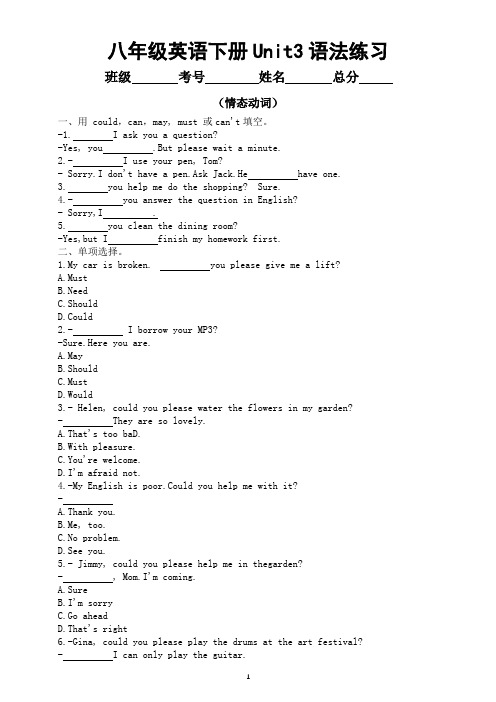
八年级英语下册Unit3语法练习班级考号姓名总分(情态动词)一、用 could,can,may, must 或can't填空。
-1. I ask you a question?-Yes, you .But please wait a minute.2.- I use your pen, Tom?- Sorry.I don't have a pen.Ask Jack.He have one.3. you help me do the shopping? Sure.4.- you answer the question in English?- Sorry,I .5. you clean the dining room?-Yes,but I finish my homework first.二、单项选择。
1.My car is broken. you please give me a lift?A.MustB.NeedC.ShouldD.Could2.- I borrow your MP3?-Sure.Here you are.A.MayB.ShouldC.MustD.Would3.- Helen, could you please water the flowers in my garden?- They are so lovely.A.That's too baD.B.With pleasure.C.You're welcome.D.I'm afraid not.4.-My English is poor.Could you help me with it?-A.Thank you.B.Me, too.C.No problem.D.See you.5.- Jimmy, could you please help me in thegarden?- , Mom.I'm coming.A.SureB.I'm sorryC.Go aheadD.That's right6.-Gina, could you please play the drums at the art festival?- I can only play the guitar.A.I'm afraid I can't.B.Yes, I can.C.Sure, I'd love to.D.Not baD.7.Mom, it's too hot. I swim in the lake?.- No, you .That's too dangerous!A.Should; can'tB.Need; mustn'tC.Must; needn'tD.Could; mustn't8.David, you please sweep the floor and take out the trash?A.couldB.mayC.mightD.must9.- Could you please do the dishes?- I cut my finger and I'm trying not to get it wet.A.Yes, sure.B.No problem.C.Sorry, I'm afraid I can't.D.That would be fine.重难点1 neither的用法1.(临沂中考)-Do you plan to watch a talent show or a sports show tonight?- I can't stand them.I plan to watch a sitcom.A.Neither.B.Both.C.None.D.Either.2.(宿迁中考)-Idon't like horror films.They're terrible.-A.Either I do.B.Neither I do.C.Either do I.D.Neither do I.3.他俩都不喜欢游泳。
译林版英语八年级上册Unit3语法练习

8A Unit 3 Grammar I一、单项选择。
( )1. There _________ three important exams next month .A. will haveB. wereC. is going to beD. are going to be( )2. Thank you very much for ______________ let me __________ on the trip today .A. agree to , goB. agreeing , goingC. agreeing to , goD. agree , to go( )3. --Mr. Bill always makes his class very lively and interesting. We all like him.--You are right. No one teaches _______.A. goodB. wellC. betterD. best( )4.He works very hard. He goes to bed eleven every eveningA、less thanB、later thanC、more thanD、much than( )5. He often does everything ______. No one knows what he plans ______.A. himself, to doB. himself, doC. herself, to doD. herself, do( )6. _______dollars ______a lot of money for me.A. Six hundred ,isB. Six hundred , areC. Six hundreds, isD. Six hundreds of, are( )7. You shouldn’t ______ because the report is very important.A. take away themB. take them awayC. take away itD. take it away( )8. _______ , it was very difficult, but about an hour later it became easier.A. In the endB. At the endC. At the beginningD. In the beginning( )9. _______to ride a bike from your school to the park?A. How long did you spendB. How far did it takeC. How long did it take youD. How far did you spend( )10. We all_______ how he made such great progress(进步) in a short time.A. believedB. thoughtC. decidedD. wondered( )11. You ______ to the meeting this afternoon if you have something important to do.A. needn’t to comeB. don’t need comeC. don’t need comingD. needn’t come( )12. David Beckham scored a wonderful goal _____ the end of the football final and the British Football Team won the game_________ the end.A. in; inB. in; atC. at; inD. at; at( )13. Don’t worry! I’ll send you an e-mail _________.A. as soon as possibleB. as soon as possiblyC. as soon as canD. as quick as possible ( )14.There are over ________places of interest from all over the world in the World Park.A. two hundred ofB. two hundredsC. hundreds ofD. two hundred( )st Sunday I went shopping with my mother, ________ bought nothing.A. andB. soC. orD. but二、词汇运用。
大学英语写作课程unit 3 语法和练习答案

PART III GRAMMARp-ing and -ed forms of verbsReference for the Classroom Activities1)That woman who is laughing is my mother.2)Finally they found the treasure that had been hidden.3)This is the place that is most frequently reported in the press.4)The boy who was enchanted stared at the screen, mouth wide open.Now, ask students to summarize the use of the -ing and -ed forms as modifiersSummary1.The –ing form of a verb is used when the action described by the verb continues to happen or when therelationship between the modified and the verb is active.2.The –ed form of a verb is used when the action is completed at the time another action occurs or when therelationship between the modified and the verb is passive.NounsReference for the Classroom Activities1).development of career educators2). readjustment of the flight timetable3). money problems of high-school art education4). country for family vacation5). the study of the growth of childhood personalityNow, ask students to summarize the rules of using nouns as modifiers.SummaryNouns can be put ahead of another noun as its modifiers in English; but too many nouns clustered can cause ambiguity and misunderstanding. Very often the maximum of nouns as modifiers is two, though sometimes this number may be exceeded. So the guiding principle for noun modifiers is that they shouldn’t pose too much difficulty to the reader’s comprehension.AdverbsReference for the Classroom Activities1)drive breezily (modifying the verb)2)strangely beautiful(modifying the adjective)3)too slowly(modifying the adverb)4)Firstly,1et’s listen to Dr.Smith’s report on his latest research.(modifying the whole sentence)Now, ask students to summarize the rules of using adverbs as modifiersSummaryAn adverb can modify a verb, an adjective, another adverb, or even a whole sentence. It usually appears after the verb it modifies but before the adjective or the adverb. If it modifies the whole sentence, it can appear either at the beginning or at the end.Problems with modifiersReference for the Classroom Activities1.The problem with these phrases is the redundancy of modifiers.The modifiers are useless for they do nothing but repeat what the following nouns say.Useless modifiers can make your writing repetitious and wordy.2.a. The notice said nothing else.b. People other than visitors were not invited to see the exhibits.c. The visitors were invited to do nothing but see the exhibits on the third floor.D. There might be exhibits on other floors but the visitors were invited to see those the third floor. Now.ask students to summarize the problems with modifiers.Summary1.One problem is about useless modifiers. A useless modifier adds nothing to the meaning of the modifiedbut redundancy.2.Another problem is concerned with misplaced modifiers. Clear writing demands that modifiers be put asclose as possible to the word or phrase being modified.PART IV WRITINGNotices (I)This section mainly discusses short, informal notices, which are normally written in the form of notes. Above all, a notice should provide key information to the reader.Suggested answer to the questionThe notices are concise, including only the essential information. They are all written in the form of notes. Ask students to summarize what they have learned in this unitPART V FOLLOW-UP EXERCISES1.1). When I was assigned a certain task, I did it to my best ability2). Fog can cause blindness.3). Recently 1 joined a social club which raises money for the care of needy children, and we meet everyWednesday afternoon.4). An essay should be understandable to the reader.5). Many items are expensive at discount stores.6). Bears that have just come out of hibernation are usually hungry and dangerous7). The author should have shortened the story by half.8). The city's environmental surroundings are not the most comfortable9). I learned certain facts that I believe are vital to every freshman.2. 1). simmer: cook food gently at or just below boiling pointsauté: fry quickly in a little hot fatbake: cook by using direct heat in an oven2). Other verbs about cooking include roast, steam, braise, fry, deep-fry, boil, poach, scramble, grill,stew, curry, baste, barbecue.3. 1). For dinner we had barbecued steaks and sweet corn.2). Last week my brother John joined an insurance company.3). He is not a friendly and easy-going colleague.4). Our view of the sea at sunset was splendid / breathtaking.5). It was a fine day to play outdoors.6). What impressed me most about the city was the hustle and bustle in the streets4.. There are seize, hurl, choke, blind, leap, flee, etc5. 1). I admire Jenny's long black glossy hair so much.2). The fearless explorer finally landed at the South Pole.3). Fast driving on a smooth road can be great fun.4). John and I often wrote each other long e-mails full of jokes5). The pale skinny woman fainted suddenly.6. 1). I invited the visiting professor to the English Club.2). Shooting stars warn us of catastrophe.3). The deleted sentence was unnecessary.4). Stephanie tiptoed up the carpeted steps.5). The students attending the art school are highly active.6). The taped dollar bill split in half.7). Amy was the only winning contestant who was below 108). The freshly painted house shone in the sun.7, 1). indescribably 2). Dark 3). occasional 4). steadily5). surely, bad 6). terribly8. 1). At his mother's request, he agreed to wait at least a year before getting married.2). Half of the girls in town were in love with Ben, but he wanted to marry Christine only.3). John hopes that in the years to come he can be as successful as his father has been.4). The winner of the contest ate almost three dozen frankfurters.5). Debbie knew that chicken when fried always pleased Ed.6). Mary could not resist the temptation to whisper in her friend's ear about what she had seen.9. In organizing the activity, the teacher can ask students to discuss what they want to put in the notices first, and then to design the layout. The notices should be simple in language, clear in meaning and eye-catching.。
最新高一英语必修一unit3-语法练习

课后强化演练Unit 3 Part ⅢGrammarⅠ.用括号内所给动词的适当形式填空1.I ________(fly) to Hong Kong tomorrow.答案:am flying2.Suppose it's still ________ (rain) tomorrow, shall we go?答案:raining3.I ________ (meet) John tonight. He's ________ (take) me to the theatre.答案:am meeting; taking4.The man who gave a lecture last October ________ (come) to our school tomorrow.答案:is coming5.When ________ your program ________ (start)? I want to know the exact time.答案:is; starting/will; start6.He ________ (leave) Beijing for London. His wife is expecting their next reunion in Beijing.答案:is leaving7.We ________ (go out) in an hour. Please make sure that everything is ready.答案:are going out8.The foreign guests ________ (arrive) in Beijing tonight.答案:are arriving9.Betty ________ (leave) for Guangzhou by plane at 3:00 this afternoon. Her brother Bob ________ (see) her off. It's half past one now. They ________ (wait) for a taxi outside the school gate.答案:is leaving; is seeing; are waiting10.The Browns ________ (go) to North China by train next week. They ________ (stay) in Beijing for a week. Then they ________ (go) to Xi'an. They ________(get) there by air.答案:are going; are staying; are going; are gettingⅡ.单项填空1.The new secretary is supposed to report to the manager as soon as she ________.A.will arrive B.arrivesC.is going to arrive D.is arriving解析:as soon as引导的是时间状语从句,要用一般现在时表示将来发生的动作。
Unit 3基础知识和语法练习 2020年冀教版英语八年级上册(附答案)

八(上)Unit 3基础及语法知识练习班级:________小组:________姓名:________成绩:________Ⅰ. 单词闯关1.________ v.庆祝→__________ n.庆祝2.________ adj.& adv.圆的;周而复始地3.________ adv.然而;不过4._________ v.好奇;想知道5.____________ n.感恩节6._______ n.过去;昔日;过去的事情& prep.晚于;在……之后→walk/go past 经过7._______ v.录像;录音& n.记录;记载→_________________________打破纪录8.____ adj.生动有趣的;充满活力的→_____活着的→____ 现场的,直播的→_____健在的9.______ n.出生;生育→give birth to生,生产10._____ n.& v.接触;联系→keep/stay in touch with 与……接触,与……有/保持联系11. ______ v.选择12._______ v.参加;出席13._______ n.回忆;记忆;记忆力14.______ n.观点,想法15.______ n.尺寸;大小16. _____ v.合适;合身17.________ adv.无论何时18.______ n.款式19._________ n.对话,交谈→have a ________ with...和…谈话20._____ n.& v.拥抱21.______ n.(一)餐;(一顿)饭食22._______ n.聚会;集会23._______ n.甜点24._____ v.邮寄→_____ sth.to sb. 把某物寄给某人25._____ adv.还;仍旧(用于否定句中)→______ 已经(用于肯定句中)26._____n.顶部;上面→at/on the _____ of...在…的顶端27._______ num. & adj.& adv.第十三(的)→________ 十三28._______ n.地址29._______ n.邮票30._______ n.邮递员;邮差→_________ (复数)31._______ adj.深的→______ adv.深地32._____ v.吹→_____ out吹灭33.______ n.气球34.______ n.蜡烛35._______ n.时尚36._______ n.吸气;(呼吸的)空气Ⅱ. 短语过关1.寻找_________2.因---而感谢某人_____________3.许多__________4.谈论_____________5.对---有用________________6.面对面地____________7.和---是一样的尺码_____________8.试穿_________9.像往常一样____________ 10在某人的帮助下_______________________ 11.在---顶上____________ 12.未能如愿;不走运______________ 13.很合身___________ 14 关掉___________ 15.许愿___________ 16.吹熄,吹灭___________ 17取回,捡起,收拾,(开车)接人________ 18.一个七天的假期_____________ 19.例如___________20.相聚__________ 21. 太---(以至于)不能--- __________ 22.把---加入---_________ 23. 与---保持联系___________ 24.玩得开心,过得愉快_____________ 25. 给---一个热情的拥抱_________________________26. 给---最美好的祝愿_________________________ 27.一切都准备好了________________ 28. 时尚;流行___________ 29.看起来像___________30. 想起_________ 31.喘不上气___________32. 远离_____________Ⅲ. 句型攻关1.We will _______ the moon that night and ___________ Chang'e.那晚我们将赏月并寻找嫦娥。
Unit3单元语法练习--动词_ing形式作定语,状语和宾补2020-2021学年牛津译林版必修第三
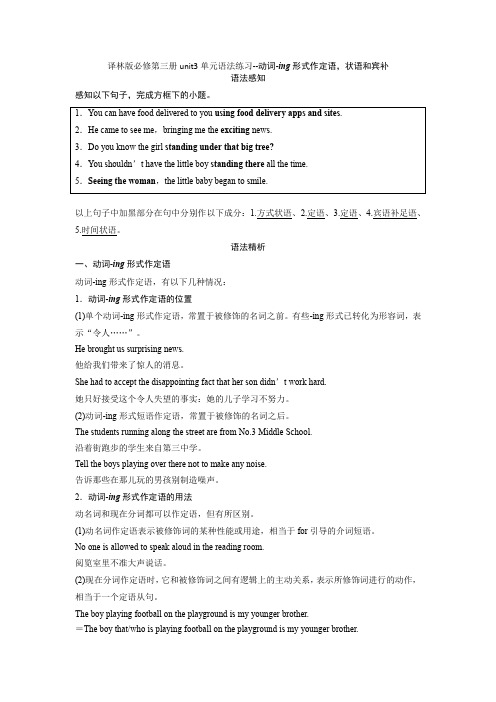
译林版必修第三册unit3单元语法练习--动词ing形式作定语,状语和宾补语法感知感知以下句子,完成方框下的小题。
以上句子中加黑部分在句中分别作以下成分:1.方式状语、2.定语、3.定语、4.宾语补足语、5.时间状语。
语法精析一、动词ing形式作定语动词ing形式作定语,有以下几种情况:1.动词ing形式作定语的位置(1)单个动词ing形式作定语,常置于被修饰的名词之前。
有些ing形式已转化为形容词,表示“令人……”。
He brought us surprising news.他给我们带来了惊人的消息。
She had to accept the disappointing fact that her son didn’t work hard.她只好接受这个令人失望的事实:她的儿子学习不努力。
(2)动词ing形式短语作定语,常置于被修饰的名词之后。
The students running along the street are from No.3 Middle School.沿着街跑步的学生来自第三中学。
Tell the boys playing over there not to make any noise.告诉那些在那儿玩的男孩别制造噪声。
2.动词ing形式作定语的用法动名词和现在分词都可以作定语,但有所区别。
(1)动名词作定语表示被修饰词的某种性能或用途,相当于for引导的介词短语。
No one is allowed to speak aloud in the reading room.阅览室里不准大声说话。
(2)现在分词作定语时,它和被修饰词之间有逻辑上的主动关系,表示所修饰词进行的动作,相当于一个定语从句。
The boy playing football on the playground is my younger brother.=The boy that/who is playing football on the playground is my younger brother.在操场上踢足球的那个男孩是我的弟弟。
高二unit3语法练习题

高二unit3语法练习题高二Unit 3 语法练习题在高二英语教学中,Unit 3是一个重要的学习单元,涉及到语法知识的运用与练习。
本文将通过一组语法练习题,帮助同学们巩固和提升自己的语法能力。
1. 完成句子(1) Although he is rich, ________.(2) ________ because I couldn't find a taxi.(3) Peter came first in the race, __________.(4) Mary has lived in New York, _________.2. 单句改错(1) They suggest him not to quit his job.(2) The bus was crowded, so we had to stand in.(3) The teacher asked me to explain the poem to class.(4) He borrowed a book from our library and returned it after a week.3. 完成对话A: I heard you went to the concert last night?B: Yes, _______ (1)____________.A: Did you enjoy it?B: Oh, yes. The music was _______ (2)_____________. A: That's great. _______ (3)______________?B: It was held in the town hall.A: ________ (4)_____________?B: About 2 hours.4. 用适当的词填空Please give me ________ help.Do you need _______ help with your homework?He never gives me _______ help.She has ________ interest in learning languages.5. 根据汉语提示,完成句子(1) 他花了一个小时来完成作业。
高中英语牛津译林版(2020)必修第三册 Unit3 语法练习题含答案

Unit3 语法练习题I 单项选择1.He sent me an email, ______ to get further information.A.hopedB. hopingC. to hopeD. hope2.— I must apologize for _______.— That’s all right.A.Letting you not knowB. not letting you knowC.letting you know notD. letting not you know3. Only one of these books is _______.A. worth to readB. worth being readC. worth of readingD. worth reading4. Tony was very unhappy for _______ to the party.A. having not bee invitedB. not having invitedC. having not invitedD. not having being invited5. _______ all the time is the key to _______ progress in English.A. Practising, makeB. To practise, makingC. Practise, makeD. To practise, make6. As I will be away for at least a year, I’d appreciate from you now and then me how everyone is getting along.A. hearing; tellB. to hear; tellC. hearing; tellingD. to hear; to tell7. A cook will be immediately fired if he is found _______ in the kitchen.A. smokeB. smokingC. to smokeD. smoked8. The policeman put down the phone, _______ with a smile on his face.A. satisfiedB. satisfyingC. to be satisfiedD. having satisfied9. The murderer was brought in, with his hands ________ behind his back.A. being tiredB. having tiredC. to be tiredD. tired10. On Saturday afternoon, Mr Smith went to the market, ______ some grapes and visited his cousins.A. to buyB. buyingC. boughtD. buy【答案】1-5 BBDDB6-10 CBADCII 判断下列句子中的动词ing部分作哪种成分1.Would you mind carrying the suitcase for us. _______2.What worries me most is her staying too late every night. _______3.They lived in a house facing south. _______4.When we returned, we found a stranger standing in front of the house. _______5.The film is found very exciting. _______6.It is no use serving up TV dinners if the kids won’t eat them. _______7.I’m sorry for not having told you the news earlier. _______8.Not knowing his address, I can’t send this book to him. _______9.She came into the house, carrying a lot of books. _______10. Seeing those pictures, she remembered her childhood. _______ 【答案】1. 宾语;2. 表语;3. 定语;4. 宾语补足语;5.主语补足语;6. 主语;7. 宾语;8. (原因)状语;9.(伴随)状语;10. (时间)状语III 按要求完成下列句子1.It rained heavily in the south. As a result, it caused serious flooding in several provinces. (用动词ing合并句子)__________________________________________________________________2.We had an anxious couple of weeks during which we waited for the results of the experiment. (用动词ing改写句子)__________________________________________________________________3.If you work hard enough, you will get academic success sooner or later. (用动词ing改写句子) __________________________________________________________________4.Weighing almost one hundred kilos, the stone was moved by him alone. (改成状语从句)__________________________________________________________________5.The tall building being built now is our new school. (改成定语从句)__________________________________________________________________6.My heart was pounding with excitement. (同义句转换)I felt ______________________________________________________________7.She stared blankly into space, and didn’t know what to say next. (同义句转换)She stared blankly into space, __________________________________________8.为了种种小毛病去看医生是浪费时间。
牛津英语初三Unit 3 语法详解与练习(不定式的结构)
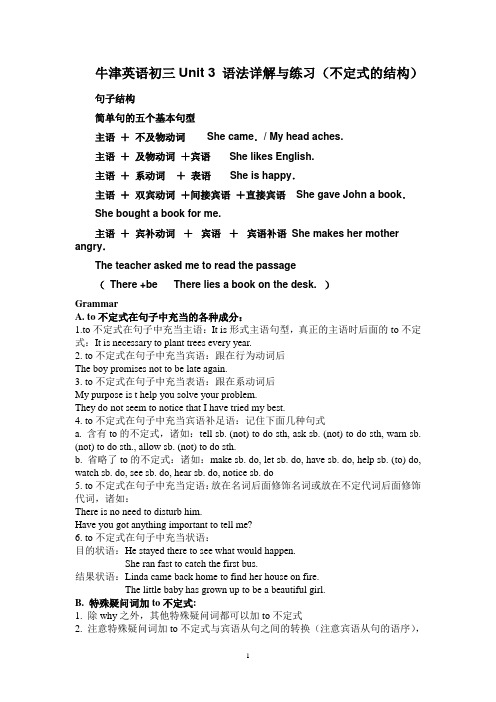
牛津英语初三Unit 3 语法详解与练习(不定式的结构)句子结构简单句的五个基本句型主语+不及物动词She came./ My head aches.主语+及物动词+宾语She likes English.主语+系动词+表语She is happy.主语+双宾动词+间接宾语+直接宾语She gave John a book.She bought a book for me.主语+宾补动词+宾语+宾语补语She makes her mother angry.The teacher asked me to read the passage(There +be There lies a book on the desk. )GrammarA. to不定式在句子中充当的各种成分:1.to不定式在句子中充当主语:It is形式主语句型,真正的主语时后面的to不定式:It is necessary to plant trees every year.2. to不定式在句子中充当宾语:跟在行为动词后The boy promises not to be late again.3. to不定式在句子中充当表语:跟在系动词后My purpose is t help you solve your problem.They do not seem to notice that I have tried my best.4. to不定式在句子中充当宾语补足语:记住下面几种句式a. 含有to的不定式,诸如:tell sb. (not) to do sth, ask sb. (not) to do sth, warn sb. (not) to do sth., allow sb. (not) to do sth.b. 省略了to的不定式:诸如:make sb. do, let sb. do, have sb. do, help sb. (to) do, watch sb. do, see sb. do, hear sb. do, notice sb. do5. to不定式在句子中充当定语:放在名词后面修饰名词或放在不定代词后面修饰代词,诸如:There is no need to disturb him.Have you got anything important to tell me?6. to不定式在句子中充当状语:目的状语:He stayed there to see what would happen.She ran fast to catch the first bus.结果状语:Linda came back home to find her house on fire.The little baby has grown up to be a beautiful girl.B. 特殊疑问词加to不定式:1. 除why之外,其他特殊疑问词都可以加to不定式2. 注意特殊疑问词加to不定式与宾语从句之间的转换(注意宾语从句的语序),诸如:1. Simon just forgot when to meet his friends.=Simon just forgot when he could meet his friends.2. Sandy wants to know where to ask for advice.=Sandy wants to know where she can ask for advice.C. 四大句型:陈述句(肯定、否定);疑问句(一般疑问句,特殊疑问句,选择疑问句,反义疑问句);祈使句;感叹句特别注意:有时选择疑问句不要误认为是一般疑问句或选择疑问句(一)To-infinitives 动词不定式Subject (主语)To plant trees every year is necessary.不定式作主语常能换成形式主语“it”.To eat too much is unhealthy for you.It is unhealthy for you to eat too much.To learn English well is important.It is important to learn English well.我们相信早上读英语是有帮助的.We believe it is helpful to read English in the morning.Predictive (表语)My dream is to be a great football player.不定式作表语,说明主语的内容,性质,特征,能接不定式作表语的名词有: dream, plan, duty, aim, purpose, job 等1. 我的目的是帮助你提高你的英语水平。
人教版五年级上册unit3语法可数名词的单复数转换练习及句子翻译
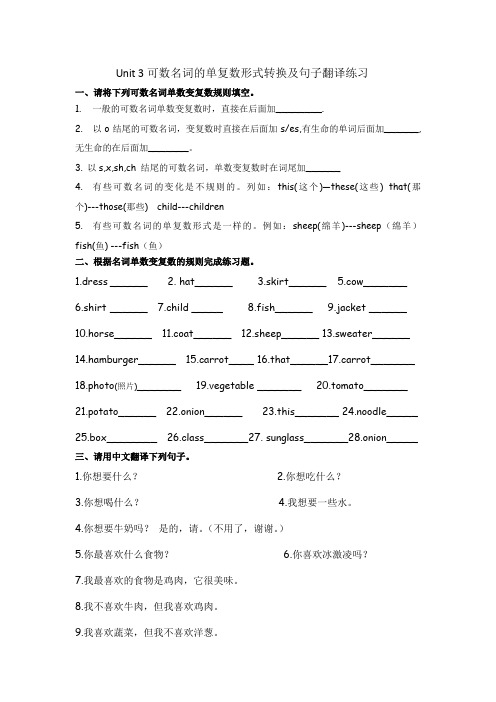
Unit 3可数名词的单复数形式转换及句子翻译练习一、请将下列可数名词单数变复数规则填空。
1. 一般的可数名词单数变复数时,直接在后面加________.2. 以o结尾的可数名词,变复数时直接在后面加s/es,有生命的单词后面加______,无生命的在后面加_______。
3.以s,x,sh,ch 结尾的可数名词,单数变复数时在词尾加______4. 有些可数名词的变化是不规则的。
列如:this(这个)—these(这些) that(那个)---those(那些) child---children5. 有些可数名词的单复数形式是一样的。
例如:sheep(绵羊)---sheep(绵羊)fish(鱼) ---fish(鱼)二、根据名词单数变复数的规则完成练习题。
1.dress ______2. hat______3.skirt______ 5.cow_______ 6.shirt ______ 7.child _____ 8.fish______ 9.jacket ______ 10.horse______ 11.coat______ 12.sheep______ 13.sweater______ 14.hamburger______ 15.carrot____ 16.that______17.carrot_______ 18.photo(照片)_______ 19.vegetable _______ 20.tomato_______ 21.potato______ 22.onion______ 23.this_______ 24.noodle_____25.box________ 26.class_______27. sunglass_______28.onion_____三、请用中文翻译下列句子。
1.你想要什么?2.你想吃什么?3.你想喝什么?4.我想要一些水。
4.你想要牛奶吗?是的,请。
(不用了,谢谢。
人教版七年级上册英语Unit 3 基础-语法巩固练习

THANKS
how do yoI ulikfeeitl about it
A. eraser B. bus C. banana D. pear
( C )3. —Please _____Helen _____765-890. —I see.
A. phone; to
B. phone; for
C. call; at
D. call; to
( A )4. —Is this _____ pencil? —Yes, it is _____ pencil. A. your; my B. her; hers C. your; me D. her; his
( D )9. —Are your parents at home? —Yes, _____ are.
A. there B. their C. theirs D. they
( D )10. —You are very beautiful today. —_____.
A. No, thanks
B. Yes, I think so
( B )5. —____, do you have a bag? —____, I don’t have one. A. Sorry; Excuse me B. Excuse me; Sorry C. Hello; Excuse me D. Sorry; Sorry
( B )6. —What’s this? —_____. A. This is pen B. It’s a pen C. It’s Jenny D. It’s three rings
七年级上册英语
Unit 3 Is this your pencil?
基础-语法巩固练习
一、单项填空。
2020人教版英语八年级上册Unit 3重点词汇、语法自测(附答案)

U3重点词汇、短语练习题一、单项选择1. Our school is very different _______ theirs. There are many beautiful flowers in it.A. inB. asC. atD. from2. —Many young people usually offer their seats to the old on the bus.—That’s good. The old should be ________. (南充)A. looked forB. listened toC. depended onD. cared for3. Betty and Mary are in ______school, but they are in _______ classes.A. same; differentB. same; the differentC. the same; differentD. the same; the different4.We should _____ our classmates because they are our friends.A. care aboutB. laugh atC. look likeD. shout at5.She often _______ us _______.A. makes;to laughB. makes;laughC. keep;laughD. keeps;to laugh6. His father is very________, and he never tells jokes.A. funnyB. seriousC. kindD. outgoing7. ________ you don’t give up, you’ll get good grades.A. As soon asB. As well asC. As long asD. As much as8. —Can you tell the differences between these two pictures?—Differences? Oh, no. They look quite ________.A. similarB. differentC. strangeD. interesting9. All his friends ______his happiness when he won the match.A. sharedB. shared fromC. shared withD. shared like10. It’s dangerous _______ with wild animals.A. for us to playB. of us playingC. for us playingD. of us to play二、根据句意或括号内所给词的适当形式填空1.Tom is ___________________(更勤奋的)than Tim.2.We didn't watch the ___________ (比赛)yesterday.3. Tu Youyou has _______ (赢)the Nobel Perize. We are very proud of her.4.Can you sing more _________ (大声地)?5.He walks into the bedroom ___________ (轻轻地)because his daughter is sleeping.6.It isn't n_________ for you to bring so many things. It's only a two-day journey.7. Do you know the m of “The Belt and Road”?8. I should study hard to get better g .9. After long-distance running, my h is beating fast.10. Don’t t it. It’s dangerous.三、按要求完成下列各题1.I don't think he is as tall as his father. (改为同义句)I think his father is_____________ him.2.I am 160cm tall. Tina is 160cm tall, too. (合并为一句)I am _____________ Tina.3.They both like eating dumplings. (改为同义句)___________ them like eating dumplings.4.Dave is heavy, but he can run very fast. (改为同义句)_____________ Dave is heavy, he can run very fast.5.It's a nice day, __________? (完成反意疑问句)2. __________, I like English very much.3. My friend ________ me. We are both quiet and hard-working.4. The apples on the tree aren’t high. You can ________ them easily.5. Anyone who _________ the law will be punished.五、根据汉语提示填空I want to______1(告诉)you something about my best friend—Mary. I ________________ 2 (与…交朋友)her about three years ago. She is an________ 3(外向的)and ________ 4(有天赋的)girl.She likes volleyball and__________5(练习)it every day. She has______ 6(赢)many prizes(奖)in ___________7 (不同的)_____________8(比赛).______ 9 (实际上),I’m quite ____________ 10(与…不同)her. I’m not ___________ 11(与…一样高)her. I don’t like sports. I’m ___________12 (更加严肃的)and ___________________ 13 (更加努力的),and I _______________ 14(取得更好的成绩).It’s not ___________ 15(必要的)to be the same. I like Mary because she helps me ________ 16 (使表现出)the best in me. She can _____________ 17(让我笑),and we can ______ 18 (分享)many things. Although I’m not __________ 19 (与…相似)her,she ______ 20(真正)cares about me,and that’s the most important thing.U3重点语法练习题一、单项选择1. It’s believed that playing computer games too much does _______ harm than good. (广东)A.manyB. muchC. moreD. most2. I can’t tell the exact time. My watch goes a few minutes _______. (河北)A. soonerB. fasterC. laterD. longer3. —Did you watch 2017 CCTV Spring Festival Evening Gala in Liangshan?—Certainly. Its theme was “fire”; at night the sky over Xichang was as _____ as that in the day with the light of fire. (凉山) A. bright B. brightlyC. brighterD. more brightly4. —Did John get Number 1 in the math exam?—Yes, no one did so _______ as him. (鄂州)A. goodB. wellC. betterD. best5. Although we are twins, I’m _____ than my brother.A. outgoingB. more outgoingC. most outgoingD. the most outgoing二、写出下列形容词或副词的比较级1. outgoing ____________2. fantastic ______________3. good ___________4. loudly _________________5. heavy __________6. early __________________7. clearly _____________ 8. serious _________________9. difficult _____________ 10. hard-working ___________答案:U3重要词汇短语练习题一、1 D2 D【点拨】考查动词短语辨析。
牛津译林版英语八年级上册 Unit 3 语法练习(含答案)
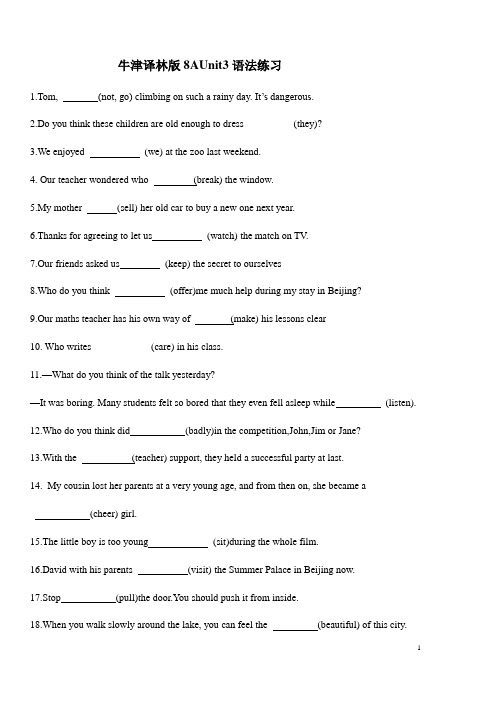
牛津译林版8AUnit3语法练习1.Tom, (not, go) climbing on such a rainy day. It’s dangerous.2.Do you think these children are old enough to dress__________(they)?3.We enjoyed (we) at the zoo last weekend.4. Our teacher wondered who (break) the window.5.My mother (sell) her old car to buy a new one next year.6.Thanks for agreeing to let us (watch) the match on TV.7.Our friends asked us (keep) the secret to ourselves8.Who do you think (offer)me much help during my stay in Beijing?9.Our maths teacher has his own way of (make) his lessons clear10. Who writes ___________ (care) in his class.11.—What do you think of the talk yesterday?—It was boring. Many students felt so bored that they even fell asleep while (listen).12.Who do you think did (badly)in the competition,John,Jim or Jane?13.With the (teacher) support, they held a successful party at last.14. My cousin lost her parents at a very young age, and from then on, she became a(cheer) girl.15.The little boy is too young (sit)during the whole film.16.David with his parents (visit) the Summer Palace in Beijing now.17.Stop (pull)the door.You should push it from inside.18.When you walk slowly around the lake, you can feel the (beautiful) of this city.19.The match (held) at the sports centre in Moonlight Town.20. (t ake) care of yourself; You aren’t a child any more21. Yesterday I ________ (drive) to my office, but this morning I rode there.22.His talk was _____________(bore), but no one left.23.When the bus stopped, they couldn’t wait(get) off the bus24. The scientists told us some stories about _________(amaze) UFOs.25.One of the ___________ (climb) got to the top of the mountain at last26.I’m sure great changes(take) place in west China in the next twenty years.27.I decided (not study) Chinese in Shanghai because it was too expensive for me.28.My brother (choose)to learn to cook five years ago.Now he is a famous cook.29.The Google map in my phone is as_________(use) as a paper one.It helps a lot.30. (lucky), he didn’t catch the last train to Shanghai.31. He came and (give) us a talk last Sunday.32.The old woman felt _(help)and didn’t know what to do.33.Thank you very much for keeping the secret to __________(you).34.We all think that (join)the class trip is great fun.35.Your gloves should (make) of leather, for they fell soft and smooth.36.Hi,boys,are you interested in_________(plan)your summer holiday?lie hopes___________(be)an animal protector when she grows up.38.The clever boy learned___________(ride)a bike by himself last weekend.39.Why not (go) to Beijing Amusement Park tomorrow?40.There (be)less and less space for wild life if humans still cut down the trees.41 (final) we got to the top of the mountain with his help last week.42. They listened to some music at the (begin) of the meeting.43.Your son is too young to look after _____________(he)44. It’s _________(real) fun to learn foreign languages.45. She will make her first _(appear) on Saturday evening.参考答案1.don’t go2..themselves3. ourselves4. broke5.will sell6.watch7.to keep8.offered9.making 10.the most carefully 11. listening 12. worst 13. teacher’s14.cheerless 15. to sit16.is visiting 17.pulling 18. beauty 19. will be held 20. Take21.drove 22. boring 23. to get 24.amazing 25.climbers26.will take 27. not to study 28.chose eful 30.Unluckily31gave 32..helpless 33.yourself 34.joining 35.be made of36planning 37.to be 38.to ride 39.go 40. will be41.Finally 42. beginning 43 himself 44..really 45.appearance。
Unit3单词语法和句型转换练习人教版七年级英语下册

七年级U3单词、语法和句型转换一、单词拼写(词汇运用)1.My (梦想) is to have a new bike.2.I don't think the story is (真实的).3.— How old is your grandmother? — She's (七十) years old.4.They often go to school by (小船).5.You can't swim in the (河).6.I have (许多的) friends here.7.Don't (离开) before I e back.8.(像) my mother, I also like red and green.9.Today I'm not free. I'm(恐怕) I can't go to your party, Molly.10.— How old is Jill? — She's three(岁) old.11.It's takes 15 (分钟) from my home to the library by bus.12.Here is a(n) (新的) bike for your birthday.13.(每个) student in my class likes Miss Li.14.My father goes to work by (地铁) every day.15.You can (骑)this horse (马). It's not too big for you.16.It takes(他)20 minutes to do his homework.17.How(远)does she live?18.He usually(开车)to work at 7:00 in the morning.二、语法填空19.I can meet some (village) on the way home.20.It usually takes 10 minutes (walk) from the classroom to the library. 21.The old woman (cross) the road with the help of a student.22.How long (do) it take you to school on weekdays?23.—Does it take you long(get) home on foot?—Yes. It (take) me one hour.24.It's fun to go on a ropeway (cross) the river.25.He usually walks (quick) and I can't keep up with him.26.It is my dream (be) a musician.27.There (be) an eraser and some pencils in the pencil box.28.There are two (hundred) students in the playground.29.In the picture you can see four old (bus).阅读下面短文,在空白处填入一个适当的词,或填入括号中所给单词的正确形式。
Unit 3 单元话题语法填空练习-八年级英语下册单元重难点易错题精练(牛津深圳)
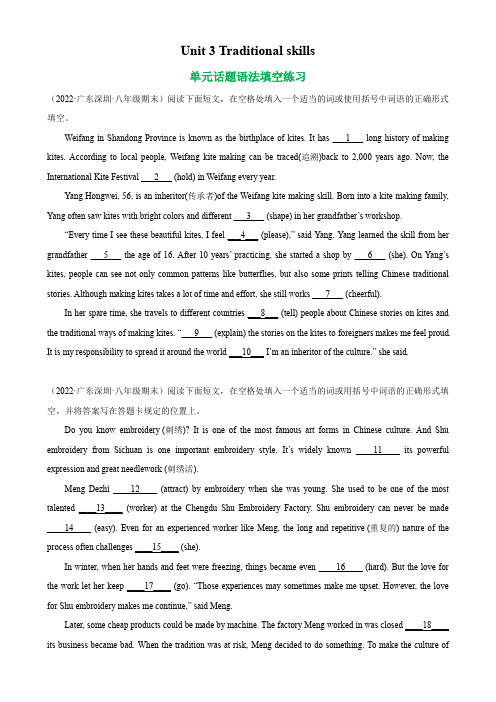
“Every time I see these beautiful kites, I feel___4___(please),” said Yang. Yang learned the skill from her grandfather___5___the age of 16. After 10 years’ practicing, she started a shop by___6___(she). On Yang’s kites, people can see not only common patterns like butterflies, but also some prints telling Chinese traditional stories. Although making kites takes a lot of time and effort, she still works___7___(cheerful).
选择性必修一 unit 3 语法 动词ing 做主语练习

选择性必修一unit 3 语法练习1. _____________ (be) a clown doctor means I can help people by entertaining them. (U 1)2. ______________(live) and _____________ (work) with others can sometimes be complicated. (U 1)3. _______________ (share) jokes and ____________(laugh) together can bring individuals and even communities together. (U 1)4. In this way, _______________ (practise) day in and day out helped Stephen sharpen his skills. (U 3)5. ______________________ (play) basketball was his dream. (U 3)I like how technology is changing sports. 6._____________the latest equipment, such as smart earphones, allows people to get the best out of their training. 7.______________video technology to help judge our sporting competitions can 8.____________sure that no one cheats. Best of all, instant replay facilities 9.______________us see all the action all over again. 10. _____________our favourite sporting moments is now a thing of the past!11. Many of us equate “commitment” with such “caring” occupations as teaching and nursing. But______________(do) any ordinary job as well as one can is in itself an admirable commitment. (2019天津) 12. ___________________(learn) to think critically is an important skill today's children will needfor the future. (2019天津)13. _______________ (travel) along the old Silk Road is an interesting and rewarding experience. (2018北京)14. __________________(talk) with your friends may make you feel better.15. ________________ (go) to bed early and _____________ (get) up early is considered to be a good habit.16. _____________________(be) able to speak a foreign language gives you a great advantage over others.17. It is no use _________________ (try) to persuade him to stop smoking.。
- 1、下载文档前请自行甄别文档内容的完整性,平台不提供额外的编辑、内容补充、找答案等附加服务。
- 2、"仅部分预览"的文档,不可在线预览部分如存在完整性等问题,可反馈申请退款(可完整预览的文档不适用该条件!)。
- 3、如文档侵犯您的权益,请联系客服反馈,我们会尽快为您处理(人工客服工作时间:9:00-18:30)。
Talk about your plans for the weekend using “I will/won’t…”.
On Saturday, I will …
On Saturday, I won’t …
Will you … on Saturday? Yes, I will.
No, I won’t.
14. 将来的生活 life in the future 15. 下面有一些想法 here are some ideas 16. 实现 come true 17. 天气的变化 a change of weather 18. 更换衣服 a change of clothes a new kind of clothes 19. 一种新型的衣服 be/ get warm 20. 变暖 21. 相当暖和 quite warm 22. 不再 no more 23. 小雨/暴雨 light / heavy rain 24. 寒风 cold wind
4 Put the words and expressions from the box into the correct column.
email Internet
heavy rain small plane
heavy work traffic jam wind
hot summer warm winter
= There won’t be a computer on every desk in
the future.
一般将来时的否定形式
It will not rain tomorrow.
It won’t rain tomorrow.
明天将不会下雨。 We will not go to school by
Home Travel
have robots, can cook, clean the room, have new kind of clothes, ...... won't travel by bus,have a small plane, long holidays, will change, quite warm,even hot, heavy rain, strong wind, ......
明天我们将乘公交车去上学吗? 是的,将会。 / 不,将不会。
一、选择题。
( )1. ________ you ________ free next Sunday? A. Will; are B. Will; be C. Do; be D. Are; be
( ) 2. There __________ a meeting tomorrow afternoon. A. will be going to B. will going to be C. is going to be D. will go to be ( ) 3. Charlie ________ here next month. A. isn’t working B. doesn’t working C. isn’t going to working D. won’t work
明天将要下雨。
It will rain tomorrow.
一般将来时的否定形式
一般将来时的否定形式,是在 will 后面加 not 或用 won’t。例如:未来每个桌子上都将没有 一台电脑。 There will not be a computer on every desk in the future.
25. 整年 all year 26. 大风 strong wind 27. 海平面 the sea level 28. 也 as well 29. 昂贵的汽车expensive cars 30. 不但...而且... not only ... but also... 31. 交通堵塞 traffic jam 32. 繁重而又艰苦的工作 heavy and different jobs 33. 轻松而又简单的工作light and easy work 34. 长假 long holidays 35. 乘公共汽车旅行 travel by bus
一般将来时的一般疑问形式
及其肯定、否定回答:
Will it rain tomorrow?
Yes, it will. / No, it won’t.
明天将会下雨吗?是的, 将会。 / 不, 将不会。
Will we go to school by bus tomorrow?
Yes, it will. / No, it won’t.
3 Put the words in brackets in the
correct place in the sentences. 先看例句: They’ll have a lot of time! (free) They’ll have a lot of free time!
1. People won’t have any jobs. (difficult) People won’t have any difficult jobs. 2. Robots will do work on farms. (heavy) Robots will do heavy work on farms. 3. People will have holidays. (long) People will have long holidays. 4. There will be rain this evening. (light) There will be light rain this evening.
Language practice
Every family will have a small plane. Teachers won’t use chalk on a blackboard. What will life be like in the future?
Will schools be different in the future?
1 Complete the questions about the
future. 例:Will students go (go) to school in the future? 1. _______________ (use) pens and paper? Will students use 2. ________________ (read) books? Will students read 3. _______________ (travel) by small planes? Will people travel 4. _______________ (send) emails to Will students send teachers?
二、动词填空。
1. ____ you ______(buy) a car next week? 2. The students __________(go) to school in the future. 3. There ________(be) a class meeting tomorrow. 4. No one ______(like) expensive things, but he does. 5. Mary and John _________(do) their homework now. 6. Thank you for _______(help) me. 7. Look! The children __________ (have) a picnic. 8. David __________(come) back in a week. 9. Jim often _______(sleep) very late in the evening. 10. Would you like _____(go) with me? 11. She wants _______ (travel) by plane. 12. I'm good at _______ (play) basketball. 13. Let him _____(go).
( ) 4. He ________ very busy this week, he ________ free next week. A. will be; is B. is; is C. will be; will be D. is; will be ( ) 5. There ________ a dolphin show in the zoo tomorrow evening. A. was B. is going to have C. will have D. is going to be
Weather
Life in the future Life in the future will be very different. We'll have robots to do everything. They will cook, clean the house and drives buses. Working hours will be short and people will have long holidays. And people will travel by plane because flying will be cheap and easy. At school, students won't use books or pens, everyone will have a computer. They will write the homework on the computer and send it to the teachers by emails. In the future, the weather will change. It will be hotter and there will be more strong wind and heavy rain. Life in the future will be very interesting.
